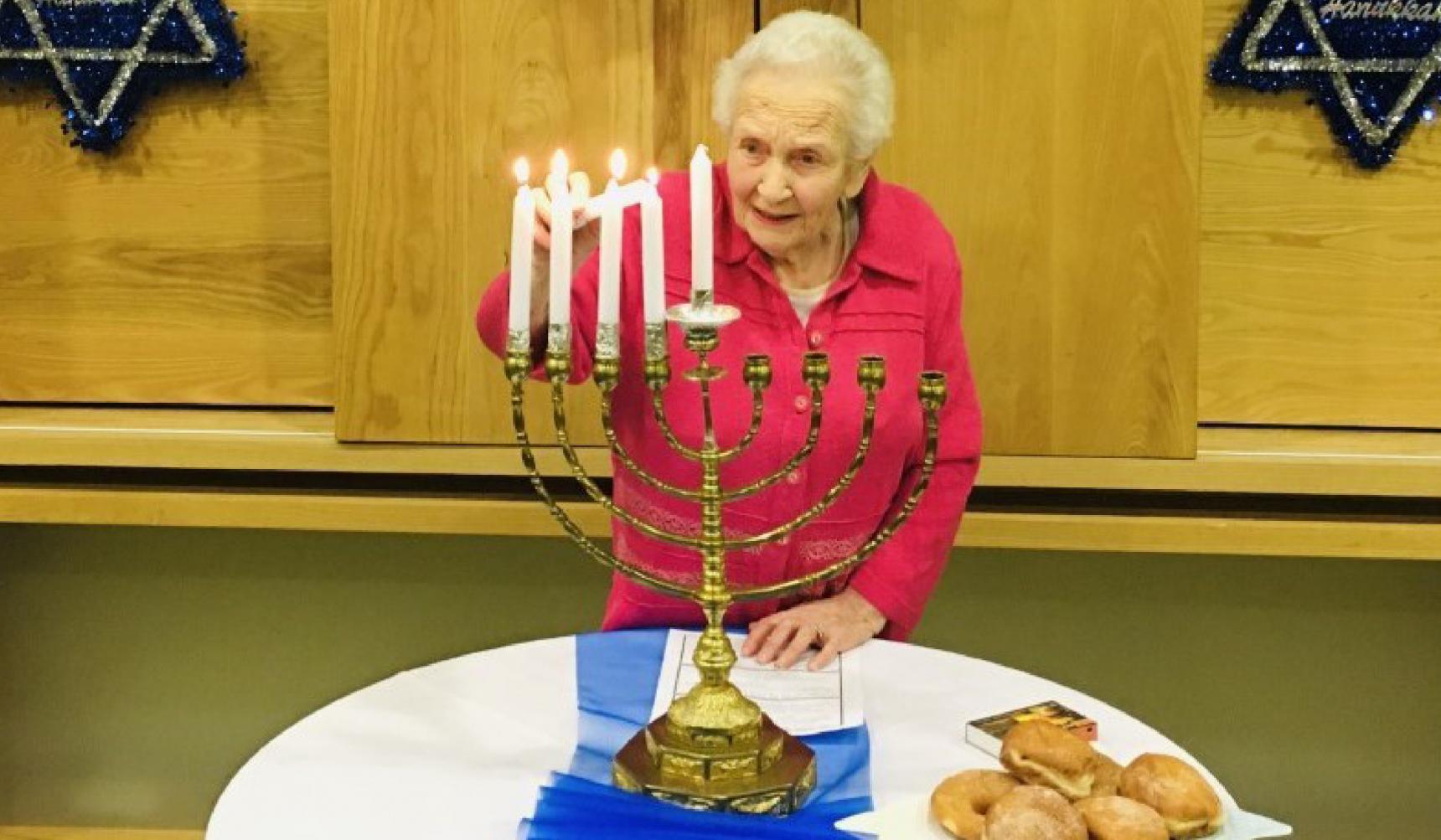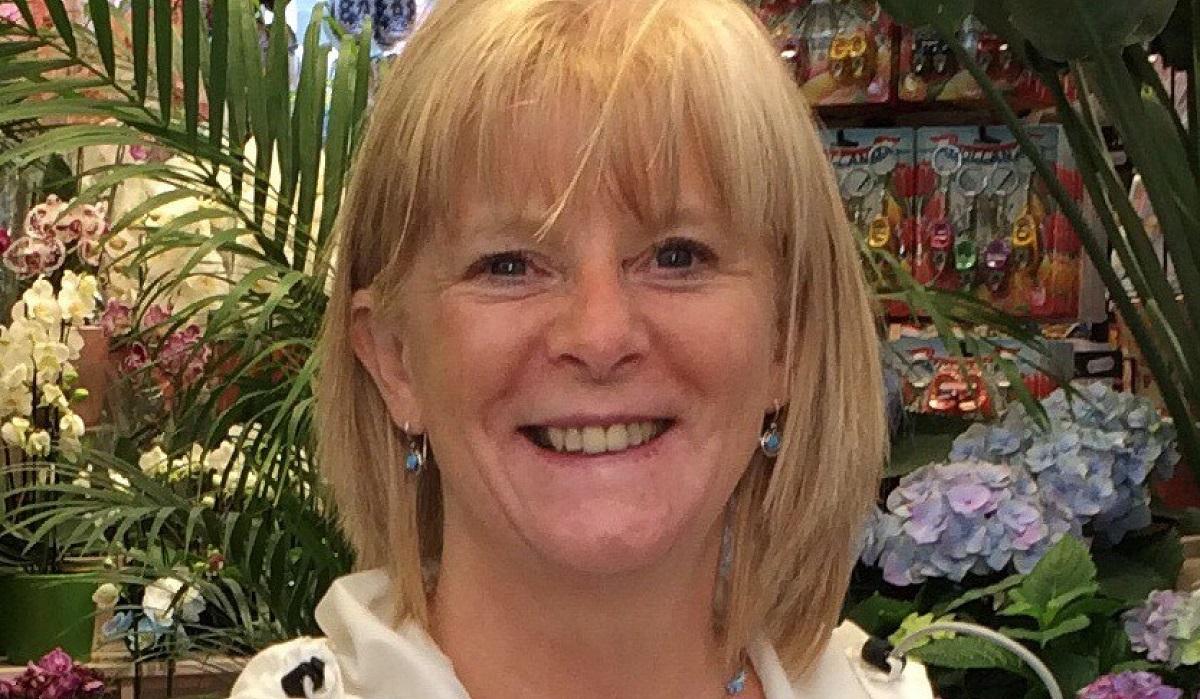
Advice
Celebrating Chanukah in care homes – advice for carers of people living with dementia
Religious festivals, such as Chanukah, give families and friends an opportunity to come together in celebration. We spoke to Jewish Care’s Gill Yentis and care home resident, Dorothea Jacobs, about what Chanukah means to them and how they will be celebrating this year.
What is Chanukah?
Chanukah, also known as the festival of lights, is a Jewish festival that usually takes places in December. The spelling is variable (sometimes written Hannukah, Chanuka or Hanukah) as it’s a Hebrew word written phonetically in English. It’s pronounced haa-nuh-kuh.
Chanukah is celebrated to remember the story from more than 2,000 years ago, where The Maccabees (a small army of Jewish people) had risen up against their oppressors.
The festival lasts for eight nights, commemorated with a nightly lighting of the menorah – a seven-branched candelabrum. Other important traditions include gift giving, games and eating of fried foods such as sufganiot (doughnuts) and latkes (potato hash browns).
Memories of Chanukah
Dorothea is living with dementia in a care home run by Jewish Care.

Dorothea lighting the menorah during Chanukah
Could you introduce yourself?
My name is Dorothea Jacobs and I am a resident at Jewish Care’s Otto Schiff care home.
How did you celebrate Chanukah when you were younger?
As a child, Chanukah was a fun time of year. We loved the presents, the chocolate and sweets we got to eat and staying up late with our family and friends to enjoy the celebrations.
I remember lighting candles and enjoying the latkes and doughnuts which we used to make ourselves. We did all of that when I had my own family, and that’s what my daughter does now with my grandchildren.
How are you planning to celebrate this year within the current coronavirus restrictions?
I’ve made some decorations to make it feel like Chanukah and my daughter is going to pass on my presents for the grandchildren. I’d love to see them at home this year, but I know that won’t be possible.
I look forward to lighting the Chanukah candles here at the home and my daughter visiting me. I’m sure we’ll be eating doughnuts and listening to the Rabbi talk about Chanukah. We have a beautiful Menorah in the garden here, which I look forward to seeing lit too.
How is Chanukah celebrated in care homes?
Gill Yentis is a Dementia Development Practitioner for Jewish Care. We asked her how Chanukah is celebrated in its care homes, and what they’ll be doing differently this year.

Gill Yentis is a Dementia Development Practitioner for Jewish Care
How is Chanukah usually celebrated in your care homes and with your residents?
The preparation for Chanukah begins with creating a special atmosphere. In Jewish Care homes, residents spend time making decorations which orientates them to realise that it’s winter, it’s getting dark early and Chanukah is coming.
Chanukah is a very experiential festival, with rituals and traditions that stimulate all of our senses. The taste, smells and sights of the traditional, not so healthy oily food – latkes and doughnuts – and the act of lighting the candles together, connect us all to memory, spirituality and Jewish cultural identity.
A dreidel is a type of spinning top with Hebrew letters on it relating to the festival. If you give one to a person with advanced dementia, many will have the muscle memory to spin it straight away, even if they couldn’t tell you what to do with it.
The sounds of the festival are important too and previously in our care homes, nursery and school children visit to sing familiar festival songs to residents, which many join in with, reminding them of the joy of Chanukahs gone by. The visits from volunteers and from our Spiritual and Cultural Advisor, Rabbi Junik, orient the residents spiritually in the meaning of the festival.
It is all part of ensuring that our residents have person-centred, culturally appropriate care which incorporates Jewish values and traditions into their care plan.
What are you doing this year to celebrate?
Our care home staff have been busy wrapping presents for each and every one of our residents. The residents have been involved with making decorations and have been enjoying the doughnuts. We will also be arranging as many socially distanced and virtual visits over the festival as we can for people with their families.
We hold Chanukah reminiscence sessions which relate to the food we enjoy and we light Chanukah candles each day in the homes together, as it gets dark for the eight nights of the festival. This brings us close to one another.
We will also be connecting on Zoom, with Rabbi Junik and with synagogues from all denominations of Jewish observance in the wider community, who have invited us to join them for candle-lighting.
‘Lighting the candles together inside the home and remembering the blessings in Hebrew, helps to connect people with their faith, memory and identity.’
We’ll also involve our residents in reminiscence and discussion groups with Rabbi Junik and volunteers and we will be having a Chanukah tea.
Primary school children have thoughtfully recorded Chanukah songs for our residents which we’ll share across our homes and we’ll be playing the familiar, traditional songs in the homes to remind people that Chanukah is here.
What advice would you give to someone who wants to have a dementia friendly Chanukah?
Chanukah is a fun time. The most important advice I can give would be to encourage people living with dementia is to engage people actively to experience as many of the sensory cultural traditions of Chanukah as possible.
‘The senses enable people living with dementia to connect to memories from the past and to the present on many levels – physically, spiritually and emotionally.’
We would always try to work out where a person is in their world and step into their world, rather than expecting them to join ours. So, trying to understand where they are and which era they are living in can be really helpful for communication.
They could be much more present in a different time of their lives, for example, as a young person excited to share Chanukah with their parents or ready to make latkes for the kids when they come from school. This can be a powerful way to open the door to memories and connect people living with dementia directly to their memory, spirituality, faith and identity.
Experiencing the traditions allow people living with dementia to relive the fun and spirit of Chanukah that goes with giving and unwrapping presents, tasting the doughnuts, spinning a dreidel and seeing more Chanukah candles burn brightly with each night.
Get dementia support
If you or someone you know needs help or support living with dementia, we’re here for you.


